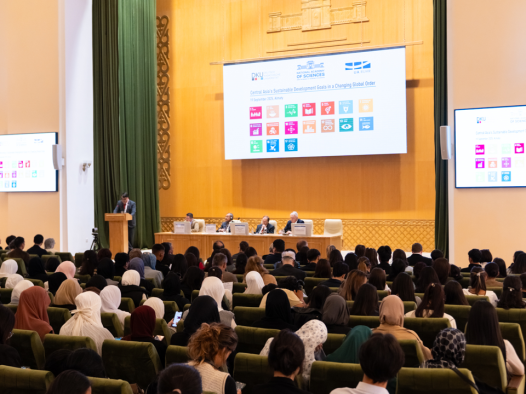


On September 19, 2025, the international forum “Central Asia's Sustainable Development Goals in a Changing Global Order” took place at the “Ғылым ордасы” building. The event was co-organized by the Kazakh-German University (DKU), the National Academy of Sciences under the President of the Republic of Kazakhstan, and the University Alliance Ruhr (Germany).
The forum became a platform for strategic dialogue among representatives of science, politics, business, and international organizations.
Welcome addresses were delivered by: Prof. Dr. Akhylbek Kurishbayev (President of NAS RK), Prof. Dr. Wolrad Rommel (President of DKU), Mr. Sayasat Nurbek (Minister of Science and Higher Education of Kazakhstan, online), Ms. Natalya Dauletiyarova (Deputy Director, Ministry of Ecology and Natural Resources, online), Mr. Matthias Kiesler (German Consul General in Almaty), Prof. Dr. Martin Paul (Rector of Ruhr University Bochum), and Prof. Dr. Karin Jacobs (Vice President of DFG).
The program included four thematic blocks: Sustainable Central Asia:Challenges and Policy, Integration of Science into Policy-Making Processes and Change, Global Approaches, and Economics and Value Chains.
In the morning session “Sustainable Central Asia: Challenges and Policy”, Prof. Dr. Wolrad Rommel outlined the key challenges for sustainable development in Central Asia. Other presentations included Ms. Baltugan Tazhamakina (Ministry of Energy of Kazakhstan) on the role of renewable energy in achieving carbon neutrality, and Dr. Caroline Milow (GIZ), who introduced the Green Central Asia initiative, emphasizing climate diplomacy and transboundary water management.
In the session “Integration of Science into Policy-Making Processes and Change”, Prof. Chokan Laumulin (KBTU, UNECE Committee on Sustainable Energy) presented an analysis of the green transition and critical raw materials. Prof. Dr.Dirk Sachse (GFZ Helmholtz) proposed concepts for sustainable use of future landscapes. Prof. Dr. Karen Shire (University of Duisburg-Essen) discussed mechanisms for translating scientific knowledge into social practice, while Prof. Dr. Gerhard Schembecker (Technical University Dortmund) shared experiences from the BRYCK startup alliance in accelerating innovation.
In the “Global Approaches” block, Prof. Dr.Andreas Löschel (Ruhr University Bochum) spoke on the future of energy systems and Germany’s energy transition, Dr. Johannes Baur (EU Delegation to Kazakhstan) addressed EU-Kazakhstan cooperation, and Philip Gass (IISD) discussed strategies for implementing complex energy reforms.
In the final block “Economics and Value Chains”, Eduard Kinsbruner (AHK Central Asia) presented mechanisms for accessing Central Asian markets, Ainur Sospanova (Qazaq Green RES) highlighted prospects for “green business,” and Gennadiy Rau (Asian Development Bank) spoke about financing natural disaster risks. Prof. Dr. Martin Paul (Ruhr University Bochum) emphasized the importance of supporting young scholars and expanding academic mobility.
In his closing remarks, Prof. Wolrad Rommel, President of DKU, stressed that the forum was an important step in strengthening academic cooperation between Central Asia and Europe.
The forum emphasized the link between “science – society – industry.” The University of Duisburg-Essen demonstrated that through interdisciplinary centers, international partnerships, and joint projects (such as membrane technologies for water and energy), scientific knowledge can be effectively integrated into practice and policymaking. A special focus was placed on the training of young researchers.
Participants confirmed common positions on key directions: climate resilience, energy transition, integration of science into governance, international cooperation, and the development of sustainable value chains. Next steps include developing “roadmaps” considering the region’s glacial and mountainous characteristics, expanding academic mobility, strengthening the technology transfer ecosystem, and advancing climate risk financing mechanisms.
Presentations were based on modern research and international programs. GIZ representatives emphasized that the Green Central Asia initiative has, since 2020, become a key platform for climate diplomacy, complementing the Paris Agreement, EU–Central Asia strategies, and national programs. Germany’s commitments in this area exceeded €250 million. Key components include the RCCAS strategy for climate adaptation in Central Asia, water management, renewable energy development, and the “green” modernization of the Aral Sea region.
The EU delegation presented the Global Gateway investment package (€12 billion), focused on transport and digital connectivity, critical raw materials, and the “Water–Energy–Climate” nexus. Expected outcomes include: accelerated renewable energy deployment, reduced energy sector emissions, improved hydropower infrastructure safety, ecosystem restoration, and stronger coordination within the Team Europe Initiative. Ongoing programs include CAWEP-4 (World Bank), EU4SustainableCentralAsia (via GIZ), and EURECA (renewable energy in Central Asia).
GFZ Helmholtz researchers showed that anthropogenic changes significantly affect the carbon cycle and water balance. Between 2002–2014, surface water reserves in Central Asia declined. Satellite monitoring and multiple data sources provide opportunities for new solutions in irrigation management and water saving. Considering landscapes as carbon sinks requires long-term strategies, including evaluating natural methods of carbon sequestration.